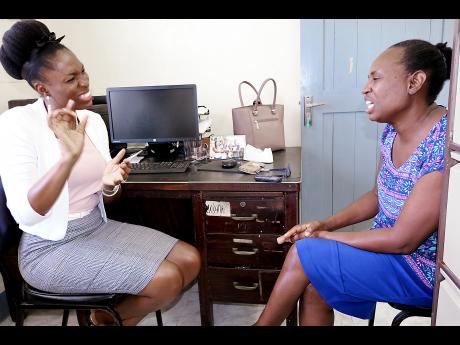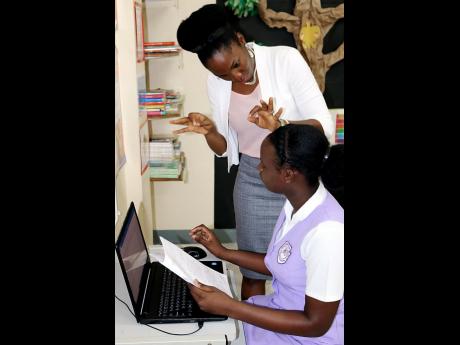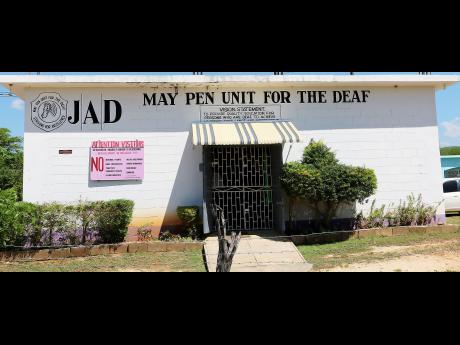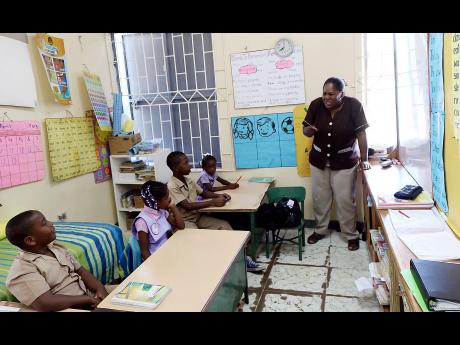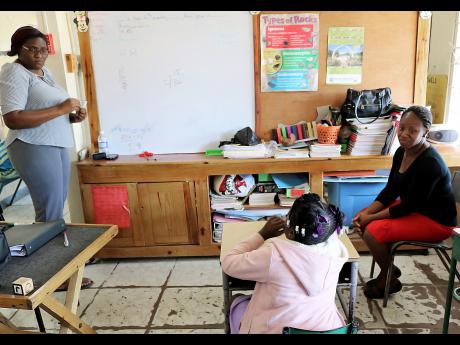Mastering the signs of communication
The struggle to grasp basic concepts of the English language is that much harder for estimated 7,500 persons who have some form of hearing challenges. For them Jamaican sign language (JSL), the native language derived from American sign language, is the medium to communicate.
"The children that are deaf, the biggest challenge that they have is the language barrier, English language," said Porsha Byfield, teacher in charge at the May Pen Unit for the Deaf in Woodside, Clarendon, a satellite school of the Lister Gilby-Mair School for the Deaf in St Andrew.
"Because they are not hearing English, they don't speak or write English," Byfield said. "Teachers here are trained to help the children transfer from the JSL to English so that they can do the national exams.
"Really, it's hard. It's really difficult. It's a struggle. It's not easy, but I'm happy to say that we have children who have achieved good grades in the exams," she told The Sunday Gleaner.
For the seamless flow of information, ease of communication and as a critical link between the concepts and their delivery, there is a need for deaf culture facilitators (DCS) to work alongside teachers, according to Byfield.
"The DCF are a part of the Jamaica Association for the Deaf (JAD). For years, JAD has been trying to convince the ministry that the deaf children need more support. Communication between deaf children and the hearing teachers, sometimes it's not really effective because they are using two different languages. Yes because the hearing teachers are not native users of the JSL, they learnt it. So the school needs more deaf adults who are natural in using JSL," she said through interpreter Antoinette Bartley, a teacher at the school.
May Pen Unit for the Deaf caters to a cross section of individuals - from children as young as 10-months-old to adults who are around 21-years of age - and aims at providing a well-needed support for the 31 students who travel from all over Clarendon and St Catherine to attend classes during the week, from Monday to Friday.
There are no special privileges accorded to these students. The only difference is in the time they are given to complete the exam, which is 15 minutes.
They are schooled to do all the exams with the education ministry approved examinations - grades two and three, and the grade four numeracy and literacy tests, the grade nine achievement test, as well as CXC's (Caribbean Examinations Council) CSEC (Caribbean Secondary Education Certificate) examinations.
"Anything other students do, we try to do it. If we don't have the resources, we don't want the children to feel left out because they are deaf. So we try to give them everything and anything for them to become the best persons," Byfield said.
These students have to pass all the regular exams, which up to grade nine are conducted at May Pen. For the CXC and CSEC they travel to Lister Gilby-Mair, which is a registered CXC centre.
Byfield who became deaf when she was 13 after contracting mumps, is now proficient in JSL.
But, she says, that proficiency in JSL does not necessarily makes one an effective communicator. According to her, the message is lost on many persons who are not so afflicted, including administrators and policy makers.
"I wasn't born deaf and JSL is not really my first language. English is," she said. "When a person is born deaf, their first language is JSL, but I learnt JSL, so there are people out there who are better at it because it's their native language. They are skilled, more proficient at it," she says in the sign language, her passion coming through her gesticulation.
"The deaf sign best, so it doesn't matter if you are in it for years, you always know that the deaf adults are best because it's their mother language. It's their first language."
This is because there are some things borne out in the reality of being deaf, which are deaf-culture specific that a person no matter their level of competence in JSL, will never be able to fully comprehend, much less communicate. That is why the DCFs are so critical to the teaching process, according to Byfield, with eight teachers and five DCFs.
In the midst of the challenges that they face, Byfield is getting help from technology.
"I am thankful for the advancements in technology, it has helped," she said. "We have computers, the Internet, I can communicate via email, Whatsapp, text all of that has helped me but the phone now to talk back that is still a challenge."
"My clerical assistant uses the phone and interprets for me whatever someone says on the phone, so she has that additional responsibility. So I have to be patient with my staff because I have to rely on them because Ms Bartley has a class, but she is here supporting by interpreting for me. So it's not easy." she added.
The school is looking into developing a website which would it share information with a much wider audience. It would also allow for greater outreach and networking which could benefit the school population.
For the time being it has a limited presence on Facebook, where an activities calendar is posted. Still the May Pen Unit for the Deaf must depend on hearing teachers for the most part to share news and other current affairs items.
"All eight teachers should have a DCF but we have only five. It would be good if we had a DCF to match each teacher in each class because all the teachers are hearing. So a teacher doesn't work alone, they have the support from the DCF as teacher's aide to support the language developments because the teachers are not native users of JSL.
So if the teacher is telling a story and the DCF watches the teacher and then maybe there is another way how to say it in JSL, the DCF will explain better, in an easier way for the children to understand."
Using herself as an example, Byfield makes the case that while education is a must for the deaf and goes a long way towards making them independent, but even then, there are limitations.
"I am the teacher in charge and I need an interpreter. I have to be calling teachers to come and give me some support so that's the struggle that deaf people face. That's the issue. It's not that they don't have potential; it's just the interpreters and other things needed."

